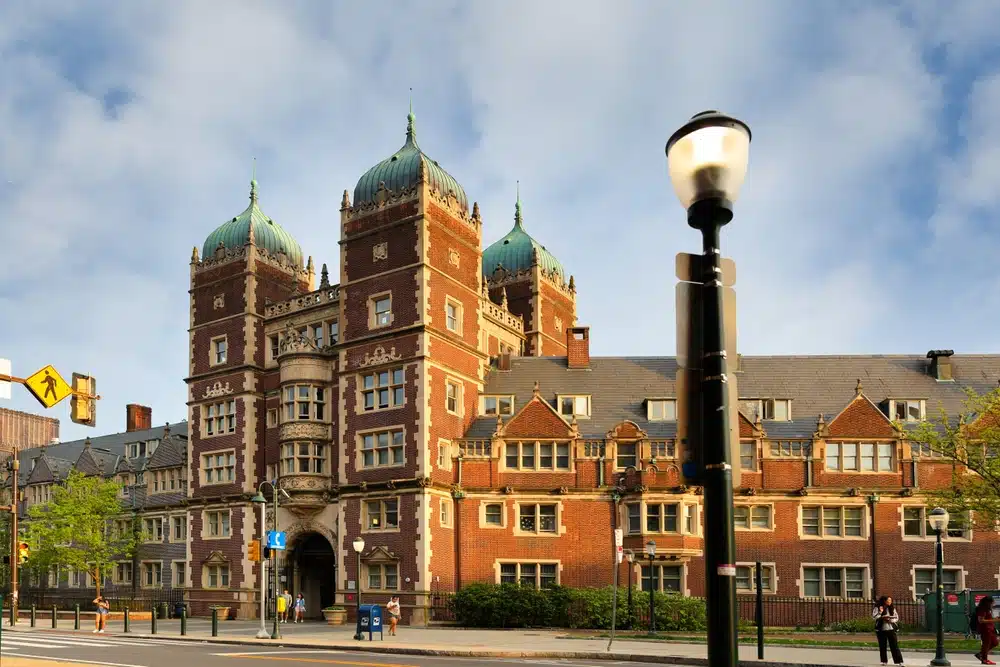Understanding UPenn’s Yield Rate
In the competitive realm of college admissions, the yield rate is a crucial metric that universities like UPenn closely monitor. Yield rate refers to the percentage of admitted students who choose to enroll at a particular institution. Understanding the significance of yield rate is vital for universities seeking to attract and enroll the most qualified candidates.
Moreover, yield rate plays a pivotal role in shaping a university’s reputation and overall ranking within the higher education landscape. As for the University of Pennsylvania, the yield rate for the Class of 2027 stands impressively at 69.66%, reflecting its ability to consistently attract and enroll top-tier candidates.
Defining Yield Rate in College Admissions
At its core, yield rate measures the effectiveness of a university’s recruitment and admissions efforts. It indicates the percentage of admitted students who decide to accept an offer of admission and enroll at the institution. The yield rate is calculated by dividing the number of enrolled students by the number of admitted students, expressed as a percentage.
A higher yield rate indicates that the university is successful in attracting students who are not only academically qualified but also genuinely interested in attending. This means that the university has effectively communicated its unique offerings and created a compelling campus culture that resonates with prospective students.
Conversely, a lower yield rate suggests that students admitted to the university either choose to attend other institutions or decline their offers altogether. This could be due to various factors such as financial considerations, personal preferences, or the perception that another university better aligns with their goals and aspirations.
The Importance of Yield Rate
Yield rate is of utmost importance to universities like UPenn as it directly affects their reputation and standing in college rankings. A high yield rate demonstrates that UPenn is highly desirable among prospective students, signaling to others that it offers a quality education and a vibrant campus experience. This positive perception can attract more talented students, faculty, and resources to the university.
Furthermore, a high yield rate increases the university’s selectivity, making it more competitive and prestigious. Universities with a consistently high yield rate typically attract top-tier faculty, stronger research funding, and greater philanthropic support. This, in turn, enhances the overall academic environment and opportunities available to students.
On the other hand, a low yield rate can be detrimental to a university’s reputation. It may suggest that the university struggles to attract top candidates or lacks the resources and offerings that students are seeking.
This can lead to a negative perception among prospective students and potentially impact the university’s ability to compete with other institutions. Therefore, maintaining and improving UPenn’s yield rate is of great importance to the university.
How Yield Rate Affects University Rankings
University rankings, such as those published by U.S. News & World Report , heavily consider yield rate as one of their ranking factors. Institutions with higher yield rates are generally viewed as more esteemed and preferred by students, thus receiving higher rankings.
This is because a high yield rate reflects the university’s ability to attract and retain students, indicating that it offers a compelling educational experience.
UPenn’s yield rate is crucial in determining its position within the Ivy League and national rankings. A higher yield rate leads to greater selectivity, which improves the university’s ranking, reputation, and, ultimately, its ability to attract exceptional students and faculty.
This positive cycle reinforces UPenn’s status as a leading institution and contributes to its continued success in various academic and research endeavors.
The Factors Influencing UPenn’s Yield Rate
Understanding the factors that influence UPenn’s yield rate is key to devising strategies for improvement. Several significant factors contribute to students’ decisions when it comes to accepting offers of admission and enrolling at UPenn.
The Role of UPenn’s Reputation
UPenn’s reputation as a leading institution impacts its yield rate significantly. The prestige associated with the university, its academic excellence, and its influential alumni network make it an attractive choice for many applicants. Students are more likely to choose UPenn over other options if they perceive it as a prestigious and reputable institution.
To maintain and strengthen its reputation, UPenn invests in initiatives that enhance its academic programs, expand research opportunities, and promote the achievements of its faculty and students. By continuously improving its standing, UPenn can positively influence its yield rate.
Furthermore, UPenn’s reputation extends beyond the academic realm. The university’s commitment to community engagement and social impact initiatives also adds to its appeal. Students who are passionate about making a difference in the world are drawn to UPenn’s emphasis on service and its dedication to addressing societal challenges. This unique aspect of UPenn’s reputation can attract a diverse pool of applicants and contribute to a higher yield rate.
Impact of Financial Aid and Scholarships
For many prospective students, the availability of financial aid and scholarships heavily influences their decision to enroll at a particular university. UPenn’s commitment to providing robust financial aid packages and merit-based scholarships allows students from diverse socioeconomic backgrounds to consider attending the university.
In addition to the financial support offered, UPenn goes the extra mile to ensure that students have access to resources that can help them navigate the complex world of financial aid. The university provides comprehensive guidance and counseling services to assist students and their families in understanding the financial aid process and exploring all available options.
Increasing financial aid and scholarships can have a direct impact on UPenn’s yield rate by making it more affordable and accessible to a broader range of students. By expanding financial aid programs and ensuring transparency in the application process, UPenn can attract more admitted students to accept their offers.
Moreover, UPenn’s commitment to socioeconomic diversity extends beyond financial aid. The university actively fosters a supportive and inclusive environment for students from all backgrounds. This dedication to creating a diverse community enhances the overall educational experience and further encourages admitted students to choose UPenn.
The Effect of UPenn’s Location
UPenn’s location in Philadelphia provides unique advantages that enhance its appeal to prospective students. The city offers a vibrant urban experience, a rich cultural scene, and ample opportunities for internships and networking in various industries.
Highlighting the advantages of UPenn’s location, such as its close proximity to prestigious companies, historic landmarks, and diverse communities, can attract students who are seeking to combine their academic pursuits with a dynamic city life. UPenn can leverage its location as a competitive advantage to increase its yield rate.
Furthermore, Philadelphia’s reputation as a hub for innovation and entrepreneurship aligns with UPenn’s emphasis on interdisciplinary learning and real-world applications. The city’s thriving startup ecosystem and access to venture capital provide students with unique opportunities to turn their ideas into reality. This integration of academic excellence with practical experience makes UPenn an attractive choice for students aspiring to make a meaningful impact in their chosen fields.
Additionally, UPenn’s location in the heart of Philadelphia allows students to engage with the city’s vibrant arts and culture scene. From world-class museums to renowned theaters and music venues, Philadelphia offers a wealth of cultural experiences that enrich students’ lives outside of the classroom. This vibrant cultural environment contributes to the overall appeal of UPenn and can positively influence its yield rate.
Comparing UPenn’s Yield Rate to Other Ivy League Schools
When assessing UPenn’s yield rate, it is valuable to compare it to other Ivy League schools to gain insights into its competitiveness and attractiveness among prospective students. Yield rates vary among these prestigious institutions due to a variety of factors.
The UPenn Yield Rate for the Class of 2027, standing at an impressive 69.66%, showcases the university’s ability to consistently attract and enroll top-tier candidates.
Now, let’s dive deeper into the world of Ivy League schools and explore the fascinating nuances that contribute to their yield rates.
Yield Rates of Ivy League Schools: A Brief Overview
Each Ivy League school has its unique reputation, strengths, and weaknesses, which affect its yield rate. Generally, Ivy League schools tend to have higher yield rates compared to other institutions due to their historical prestige, academic rigor, and extensive resources.
Let’s take a moment to appreciate the rich history and traditions that surround these esteemed institutions. From Harvard University, the oldest university in the United States, to Yale University, known for its distinguished alumni and picturesque campus, each Ivy League school has a story to tell.
While UPenn consistently maintains a strong yield rate, it may differ from other Ivy League schools due to factors such as location, specific academic programs, and extracurricular opportunities.
Let’s explore these factors in more detail and uncover the unique characteristics that make UPenn stand out among its Ivy League peers.
Factors Contributing to Differences in Yield Rates
Differences in yield rates among Ivy League schools can be attributed to various factors. For instance, a university’s reputation, perception within certain fields of study, and the demographics of the student population can all impact the yield rate.
Imagine the bustling campuses of Ivy League schools, filled with students from diverse backgrounds, each bringing their own unique perspectives and aspirations. These vibrant communities foster an environment of intellectual growth and collaboration.
Additionally, unique aspects of the campus environment, such as the availability of research opportunities or distinctive academic programs, may influence students’ decisions.
Let’s take a moment to delve into the academic offerings and extracurricular opportunities that UPenn provides. From its renowned Wharton School of Business to its prestigious School of Engineering and Applied Science, UPenn offers a wide range of programs that cater to students’ diverse interests and career aspirations.
Moreover, UPenn’s location in Philadelphia, a vibrant city known for its rich history and cultural scene, adds another layer of appeal to prospective students.
Understanding the reasons behind these variations can inform UPenn in its efforts to improve its yield rate and enhance its appeal relative to other Ivy League schools.
As UPenn continues to evolve and adapt to the ever-changing landscape of higher education, it will undoubtedly find innovative ways to attract and retain top-tier students.
So, next time you come across UPenn’s yield rate, take a moment to appreciate the intricate web of factors that contribute to its standing among the Ivy League schools.
Strategies to Improve UPenn’s Yield Rate
While UPenn attracts a considerable number of exceptional applicants, there are always opportunities to enhance its yield rate further. Implementing targeted strategies can contribute to a higher yield rate, solidify UPenn’s reputation, and ensure it remains competitive within the Ivy League and beyond.
Enhancing Campus Life and Student Services
Creating a vibrant campus community and providing exceptional student services are crucial in attracting admitted students to enroll at UPenn. The university can invest in state-of-the-art facilities, modernize residence halls, and expand recreational and extracurricular activities.
Additionally, fostering an inclusive and supportive environment, offering comprehensive mental health services, and prioritizing student well-being will significantly contribute to a higher yield rate. Ensuring students have a memorable and fulfilling experience during their time at UPenn will encourage them to accept their offers and become proud members of the university community.
Strengthening Academic Programs and Faculty
UPenn’s academic programs and faculty play a pivotal role in attracting top-tier students. Continuously enhancing and expanding academic offerings can increase the likeliness of admitted students choosing UPenn over other institutions.
Recruiting and retaining distinguished faculty members who are renowned in their fields will not only enhance educational experiences but also elevate UPenn’s reputation. By investing in research, facilitating interdisciplinary collaborations, and providing ample resources for faculty development, UPenn can create a compelling academic environment that appeals to prospective students.
Increasing Outreach and Marketing Efforts
To maintain and boost its yield rate, UPenn needs to effectively communicate its strengths and advantages to prospective students. Implementing targeted marketing campaigns, providing comprehensive information resources, and conducting campus tours can effectively showcase UPenn’s unique attributes.
Engaging with prospective students virtually and in person, attending college fairs, and forging partnerships with high schools and educational institutions can increase UPenn’s visibility among students who may be a good fit for the university. By actively promoting its strengths, UPenn can attract more admitted students to choose UPenn as their educational home.
The Future of UPenn’s Yield Rate
Moving forward, several trends and influences have the potential to impact UPenn’s yield rate. Adapting to these shifts and capitalizing on emerging opportunities will be critical in ensuring the university’s sustained success.
Predicted Trends and Influences
The COVID-19 pandemic has significantly disrupted traditional college admissions processes. Virtual learning, remote work arrangements, and travel restrictions have made it more challenging for prospective students to fully experience and evaluate the campuses they are considering.
As the world recovers from the pandemic, it is crucial for UPenn to adapt its admissions strategies accordingly. Expanding virtual campus tours, enhancing online engagement with prospective students, and incorporating remote learning options can make UPenn’s offerings more accessible and appealing to a broader range of applicants.
The Role of Online Education and Remote Learning
The rapid growth of online education and remote learning presents both opportunities and challenges for universities like UPenn. As more students embrace online learning options, universities may need to consider how they can integrate technology into their educational models.
UPenn can innovate by offering online programs, hybrid courses, and flexible learning options. By leveraging technology effectively, UPenn can attract a greater number of high-quality applicants who are interested in the benefits and convenience offered by online education.
As UPenn aims to maintain its esteemed place among educational institutions, continually evaluating and improving its yield rate is paramount. By understanding the importance of yield rate, recognizing the factors that influence it, and implementing targeted strategies, UPenn can ensure its position as a top choice for aspiring students.
Ultimately, UPenn’s yield rate serves as a barometer of its ability to attract and retain outstanding students, reinforce its reputation, and solidify its standing among the University of Pennsylvania community and the broader academic world.
Having all the necessary information is important before choosing any course of action. AdmissionSight is always here to assist you with any questions or concerns. We have more than ten years of expertise assisting students in successfully navigating the challenging admissions process.
Consult with AdmissionSight and find out what we can do to help you get into the school of your choice by ensuring that you are sufficiently aware and well-prepared for the application process.









































